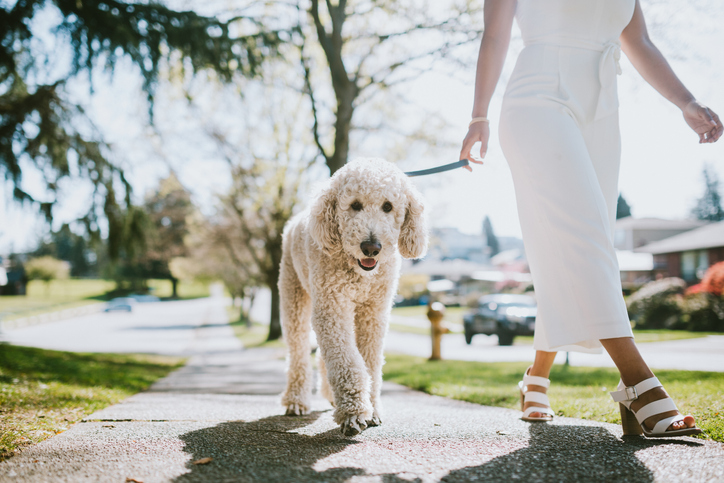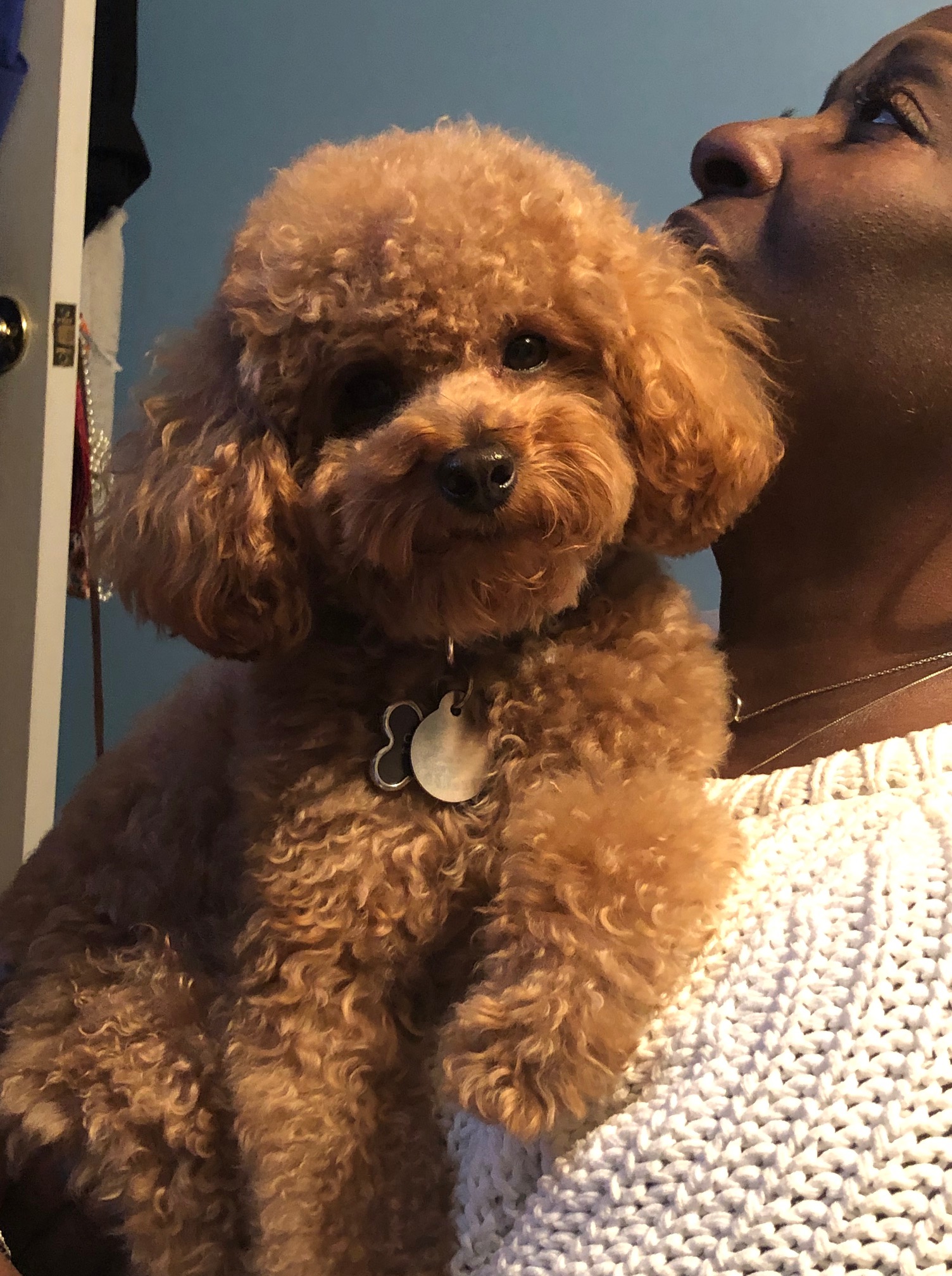
Source: RyanJLane / Getty
This morning, during my daily pursuing of Twitter, I stumbled upon this question someone sent to Slate Magazine’s advice column Dear Prudie.
I was tic-kled because I already knew this was a White person writing in, likely speaking about a Black dog owner. And the first sentence of the query erased all doubt.
Q. I just love dogs: I live in the downtown area of a gentrifying city. I have worked intentionally to become part of the community I joined, while respecting its roots—supporting local business, volunteering, etc. I know I have lots of unconscious racial biases, but I try hard to listen and not cause harm. I also really love dogs. I have an awesome dog. He is cute and friendly, and we know lots of people in our neighborhood who I wouldn’t otherwise have any reason to interact with. Having a cute, friendly dog, I am very used to people paying attention to him and not talking to me. Not only do I not mind this, it brings me joy to see people dote on him. I also talk a lot at my job and can sometimes feel burned out from any more conversation than I’m professionally obligated to engage in. I am friendly with some fellow dog parents, and dogs being the focal point of our interaction often seems like a global inside joke.
About a month ago, a woman somewhere in my age range moved immediately next door to me. She is black. I am, if it isn’t obvious by now, white. I was bringing my dog in when she was moving in, and she said she knew someone would want to say hello. She opened her door, and her own adorable dog ran out. The dogs happily greeted each other. I was happy and even harbored visions in the moment of exchanging keys with my new neighbor and helping each other with dog walks on occasion. A few weeks passed, I had some travel, and then after I returned, I saw them on the street when I was racing off somewhere, and I cheerily said hello to the dog. Later that day I saw them again and, again, said hello to the dog. My neighbor yanked the dog away from me and my dog and yelled, “Don’t say hi to my dog if you aren’t going to say hi to me.” I was extremely surprised and faintly called after her, “I just really love dogs.”
Prudie, she clearly thinks I’m racist, when I really just love dogs. I have seen her since then and gotten a similar aggressive ignoring response, though no more comments. What can I do? Should I put a note under her door? What should it say? “I’m not racist, I just love dogs” seems a bit reductive, but it is the truth. I usually operate with a fairly high level of emotional intelligence, and I am completely stumped by the appropriate move here. I no longer harbor happy ideas of us becoming neighbor friends. Am I racist and clueless? Help me.”
I was eager to read “Prudie’s” advice because Daniel Mallory Ortberg is generally spot on. But after I finished it, I was left wanting a bit more. Ortberg told this person that he or she might have been spiraling out a little bit, telling the writer that their primary concern was to not appear racist, which was misguided. Ortberg said that a note would be overbearing and might further freak the neighbor out. He did tell the writer that an appropriate response to the Black woman would have been, “‘I’m sorry I was rude. I’ll say hello next time we run into each other.’ Not ‘I just really love dogs.” Basically, Ortberg ended the note with an “everybody isn’t going to like you” and left it at that.
But being the Black woman I am, having shared this same experience, I wanted him to drill down even further. But being that Daniel Mallory Ortberg is not Black himself, he might not have had the range.
A couple of years ago, my sister and I flew home to our hometown of Indianapolis, Indiana to be with my mom during her double mastectomy surgery. The whole thing went very well and a few days later, we decided to take a walk downtown as a family. At this point, the family included my mom, dad, sister, myself and Ollie, the new teddy-bear-brown colored toy poodle she had gotten a few months before.
I spent the first 18 years of my life in Indianapolis and never have I been approached by so many White people in one setting before. Never. And really, it wasn’t us they were approaching, it was the dog. Their eyes never met ours as they crouched down to greet Ollie. After speaking English words to a dog who didn’t understand them, they offered silent smiles in our direction. They spoke to their fellow White friends and loved ones about how cute he was, never looking in our direction at all. As someone who’s been called a n*gger, taunted with the Confederate flag and experienced all types of microaggressions in the great state of Indiana, I’m never yearning to interact with strange White people. Still, watching them fawn over a dog and ignore us, the only thing I could think was, “Ain’t that about a b*tch.”
In White people’s defense, my mom’s dog is cute AF. So much so that she has irrational fears of people stealing him.
Exhibit A:

Source: Veronica Wells / Courtesy of Veronica Wells
Still, culturally Black folks and other people of color place a high value on speaking and acknowledging other human beings in various settings. And it’s annoying not that White folks don’t share that social norm with us, but that they would extend this courtesy to an animal first and exclusively.
One woman we saw on the walk was brought almost to tears seeing him. To her credit, once she collected herself, she asked us if she could pet him. We lifted him up and to my utter delight, Ollie used his paw to push her hand away. My mom’s dog is sensitive and clannish but I took his rejection to her touch as a symbol that he too wasn’t with the bullsh*t.
When we talk about racism, so often Black people speak about White folks caring more about dogs than they do about Black folk. Dog and cat videos make up the highest consumed content on the web. We make jokes about White people letting dogs kiss them in the mouth—while simultaneously not wanting a Black person to move next door. And most importantly, a video of a dog being abused is far more impactful to White folks than a Black person being murdered on tape. White celebrities rally behind animal cruelty in ways they never have when it comes to racism or police brutality. You need only watch the commercials from the ASPCA featuring Sarah McLachlan’s “Angel.” (Those ads raised $30 million in its first year of airing in 2007.) Or see Jimmy Kimmel being brought to tears discussing the death of Cecil the Lion in the same year Walter Scott, Sandra Bland, Freddie Gray and 97 other unarmed Black men and women were killed by the police. There were no tears for them.
I know we, as human beings, have the capacity to care about more than one issue at a time. Still, the care and concern for animals is far greater than what it should be for the Black people with whom White folks share an entire species.
And so while I appreciate Ortberg telling the writer that he or she shouldn’t be concerned about being liked by the Black neighbor, I wish he’d provided a little context as to why speaking to a dog over a person is at best rude as hell and at worst, racist as f*ck. I guarantee it would help the writer fare better in that Black neighborhood they’re gentrifying.









